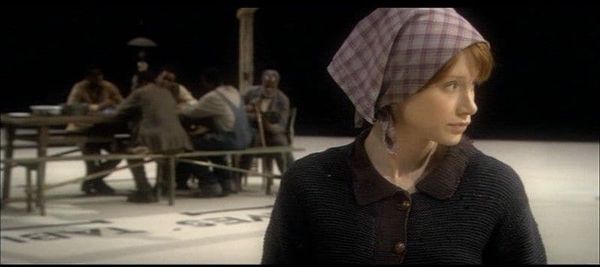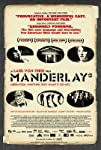Eye For Film >> Movies >> Manderlay (2005) Film Review
Manderlay
Reviewed by: Chris

Introducing Part 2 of Lars von Trier's American Trilogy, actor Danny Glover says, "The process of storytelling is an enormous responsibility and opportunity." It is one that the Danish director takes very seriously, constantly seeming to question his role and duty as an artist and whether that duty is to the audience, or to art itself.
With his Dogme films and the later American work, Dancer In The Dark, Dogville and Manderlay, his answer seems to be firmly towards art as a worthy end in itself, or, at least, as a serious medium by which to raise (though not answer) questions of social conscience. He makes little, or no, concessions towards audiences who are not interested in what he has to say.

Manderlay is a story about emancipation from slavery and, on a deeper level, of the more topical problems of introducing democracy. It continues the Dogville tradition of using Brechtian acting on a semi-bare stage. The immediate dissociation this brings from any semblance of everyday reality, focuses our attention on the issues, in a similar way that Greek tragedy, or grand opera, is able to do, by insisting that ordinary details are secondary, or even irrelevant, to the main theme.
Grace (Bryce Dallas Howard takes over seamlessly from Dogville's Nicole Kidman) travels across America with her father and comes across an isolated town where slavery has not been abolished. With a pure heart, good intentions and the power of her father's lawyer behind her, she makes well-meaning but unfortunate, ill-informed attempts to put things right. She never stops to question the fact that she knows best, or whether her high moral values are appropriate, or whether they will win the day. Not unexpectedly, there is much trouble in store for her.
Manderlay is deeply philosophical, while at the same time highly coherent and accessible. It asks important and necessary questions about the nature of freedom and democracy. Such questions - and the discussion this film makes possible - are urgently needed in the light of such unsolved dilemmas as the continuing conflict in Iraq, the philosophical basis for the removal of Saddam Hussein, the introduction of western-style democracy to countries that have a different concept of government. The broader practical problems (also tackled here) of how to restore power to those who have been disenfranchised, whether by slavery, colonialism, dictatorships or market forces, is one that applies all over the world, irrespective of morality.
US internal and foreign policy is an ideal example for any artist tackling such issues, as it's visibility provides a common focus. Sensitive citizens, however, will mistakenly see the film as anti-American and avoid it, which means that the people in power, who would most benefit from a viewing, won't.
Von Trier has discharged his duty as one of the most intelligent filmmakers of our time. He has discarded sensationalism, using art as a tool to help us think outside the square, and his thinking is both profoundly stimulating and fully accessible to those with the patience and inclination.
Does art need to tantalize and seduce? If so, we would miss out on some of the finest literature, the greatest plays, anything that does not provide immediate sensory satisfaction. Works such as Manderlay help to present cinema as one of the great intellectual arenas of art - one that has the power to inform, enrich and enlighten.
Reviewed on: 06 Nov 2005




















